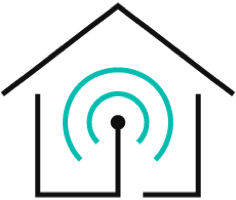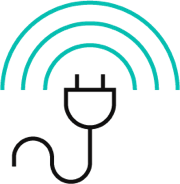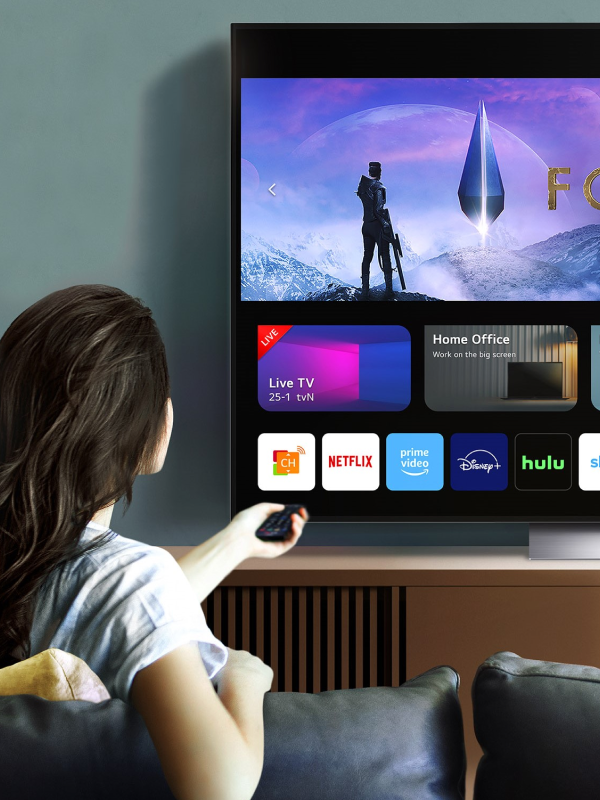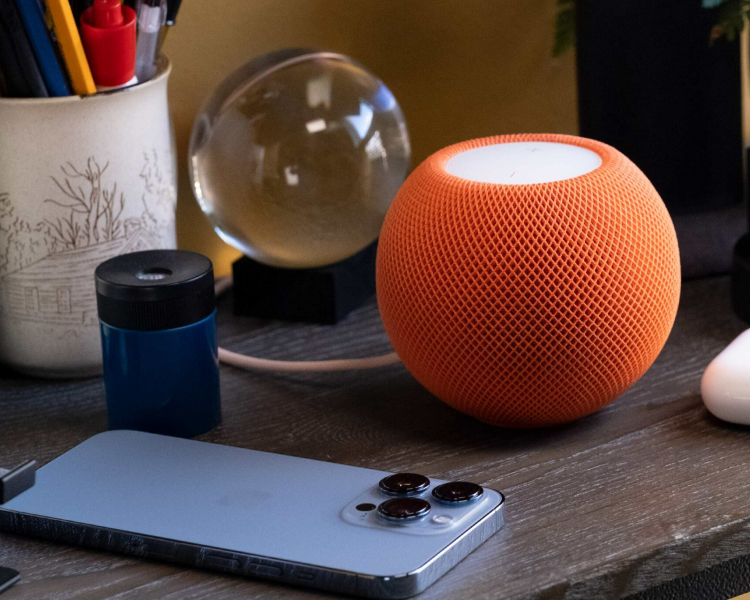What attributes do smart TVs have? Naturally, integrated internet! A connected TV, often a smart TV or CTV, has web-enabled interactive features. A smart TV combines a modern television's huge screen with a mobile device's potent computer system.
You can use this potent informational tool to browse the internet, view images, listen to music, and watch your preferred entertainment content via conventional broadcast or over-the-top and on-demand streaming.
The operating system and several programs or apps preloaded on smart TVs are usually well-known favorites like Netflix, Hulu, and Spotify. From there, you can easily install or remove apps using a built-in app store, much like on a smartphone.
Since we are talking about smart appliances and gadgets, EVVR has been a trusted partner of its clients since its inception. We have developed and refined multiple products across the smart home niche to ensure that all customers live their lives to the fullest!
- What Is A Smart TV?
- How Does A Smart TV Work?
- Benefits of Having A Smart TV
- Are Smart TVs More Vulnerable To Cyberattacks?
- Comparison Between Smart TV & Regular TV
- Connecting Your Smart TV To WiFi
- EVVR Energy Monitoring Smart Plug Provides Energy Insights With Remote Control Capabilities
What Is A Smart TV?
A digital television, known as a "smart TV," is essentially an Internet-connected, storage-aware computer designed specifically for entertainment.
While standalone smart TVs are an option, standard televisions can also be made "smart" using set-top boxes with sophisticated features.
Smart TVs come with additional hardware, different connection options, a TV operating system with a GUI, and can passively receive cable, satellite, or over-the-air (OTA) transmissions. Thanks to these adaptations, viewers can access and manage capabilities for streaming material from Internet video providers and linked devices.
In addition to coaxial cable, HDMI, and other audio-video connectors, smart TVs enable Ethernet, WiFi, and USB. The connectors provide on-demand video services and access to photos, music, and videos stored on linked storage devices in addition to the OS and apps. Connecting to websites like YouTube, Netflix, Hulu, Vimeo, and Twitter is possible with smart TV apps.
Smart TVs may wirelessly link to a wide range of potential input devices.

How Does A Smart TV Work?
Your personal WiFi network and a wired Ethernet connection (for the most reliable speeds) are some of the ways that smart TVs can connect with your internet. You will have to provide the username and password while setting it up.
After connecting, you'll have access to a vast selection of "channels" (apps) to view various media. However, many of these require subscriptions, so you must research different streaming services and choose the ones you want to join up for. Some are free, and most have a monthly fee.
Sometimes, a smart TV may need more power from your WiFi signal. In such a scenario, updating your home wireless network may be something you need to think about. To achieve the best performance and compatibility with the most recent wireless technologies, if you have an older modem/router, consider purchasing a newer one built in the previous three years.
If it doesn't work, consider installing a WiFi extender to get wider coverage across your house. Simply put your wireless router and TV may be too far apart.
Those who have used a streaming video device before will be familiar with the usual remote control for a smart TV. You may complete much of the necessary navigation by using the arrow keys, an Enter or Select key, and a Home or Menu button.

Benefits of Having A Smart TV
The smart TV is popular because it eliminates the need to connect a separate connected streaming device, like a Roku or Amazon Fire.
Most smart TVs may also be used with a broadcast antenna or satellite/cable to enjoy the best of both worlds. For instance, you may still receive the high-tech internet TV and over-the-top options with most models if you frequently watch local sports using an antenna.
The ability of smart TVs to work with smart home gadgets like Google Assistant or Amazon Alexa is another emerging trend. You may use them to watch smart lights, doorbells, locks, thermostats, and more by connecting your smart TV to your linked home system and changing channels by voice command.
Remote functionality is missing from the that needs to be added. But you do not need to spend a fortune to get that. EVVR Energy Monitoring Smart Plug & Relay can help you with the energy consumption information of your TV while allowing you to turn it on or off via a smartphone application.
Are Smart TVs More Vulnerable To Cyberattacks?
Knowing that many smart TVs include built-in webcams and microphones is crucial. This could raise the likelihood that third parties would hack these devices to spy on users or that businesses could utilize constant surveillance for marketing purposes.
Malware attacks like viruses or worms are also a possibility. If you use it for online shopping, it could then be possible for hackers to gain access to confidential data or financial information.
These factors make it crucial to protect your home WiFi and employ parental controls if you have kids. You can speak with the TV manufacturer to learn which security and antivirus software is appropriate for the smart TV platform, as there is a growing market for such software.
If you are concerned about security threats, you can choose a streaming media device instead of a smart TV. These devices often have the same features and functionality as a smart TV but lack a built-in microphone or webcam.
Comparison Between Smart TV & Regular TV
You may have noticed a wide range of smart and regular TVs when looking for a new one. But how are the two different from one another?
Regular TVs exist in various sizes, from huge to small, from regular resolution to 4K, with a wide range of pricing. The "smart" component of the TVs is where things become a little trickier.
Smart TVs can play more than just videos and images. A smart TV these days can play music, stream videos, and perform many other tasks. This could involve getting information on sports, perusing social media, or using your favorite applications.
A typical TV lacks computing power, making it impossible to connect to the internet. In a nutshell, it works more like a bigger computer display. Most developers have converted older TV models into smart TVs. These are great for consumers who don't want to speed up a new television. They calaterdle apps or web browsing.
Smart televisions used to be the finest option when you needed to enjoy TV shows or movies in HD.
With high-resolution streaming options available for 4K and even 8K, smart TVs can keep up with these developments. For a more cutting-edge viewing experience, they may analyze the data and send it to the unit. They are the ideal option for those who prefer easy access to all their favorite material in one location.
Connecting Your Smart TV To WiFi
A smart TV connects to your home network to stream videos and other services to your TV. It can do this using wired Ethernet or built-in WiFi. Most modern TVs are 802.11ac WiFi compatible, although older models may still use the less modern 802.11n standard. Some of the most recent models will support the new WiFi 6 standard, although it's still uncommon (for more information, see our article about WiFi 6: What it is and why it's superior).
There are a couple of solutions if your smart TV isn't receiving a strong enough wireless connection. Any model on our list of the best WiFi routers will work if you need to upgrade, including the more affordable models.
Another alternative is to use mesh routers, which provide coverage throughout the entire house and are ideal for households with several TVs that are not all located close to your primary network. In our tests, two such products—the Nest WiFi and Netgear Orbi WiFi 6—proved to be good choices for those attempting to wire a sizable home with WiFi.
EVVR Energy Monitoring Smart Plug Provides Energy Insights With Remote Control Capabilities
Do smart TVs consume ghost power? How much does running a TV for a couple of hours cost in electricity bills? If these questions often come to your mind, we will put you and your mind at ease! EVVR Energy Monitoring Smart Plug & Relay is a smart little device that can turn your smart TV into a smarter one by doing two important things - allowing you to access energy consumption stats while giving you the control to turn it on or off remotely. So, what are you waiting for? Feel free to place your order now!















